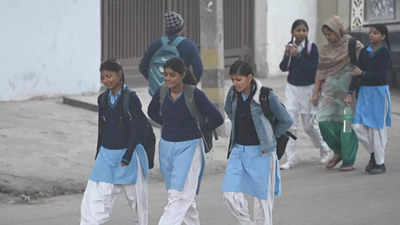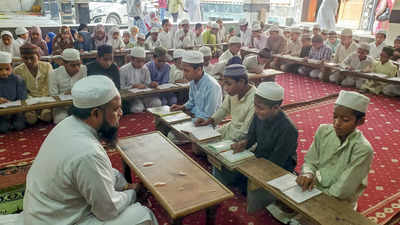GRAP Stage 2 invoked in Delhi-NCR: Check what precautions students and schools should take

[ad_1]

NEW DLEHI: As the air quality index (AQI) in Delhi continues to worsen, the Commission for Air Quality Management (CAQM) has activated Stage 2 of the Graded Response Action Plan (GRAP), with the AQI recorded at an alarming 317, classified as “very poor.” This rise in pollution levels is a cause for alarm, particularly as we approach the festive season of Diwali, which typically sees increased air pollution due to firecrackers and other activities.
The India Meteorological Department (IMD) has forecast that the daily average AQI is expected to remain in the ‘very poor’ category in the coming days, attributed to unfavourable meteorological conditions and the practice of stubble burning in neighbouring Haryana and Punjab. As air quality continues to deteriorate, schools are urged to take proactive measures to protect the health and well-being of students.
Understanding the GRAP Stages
The GRAP is a framework designed to combat pollution in Delhi-NCR, with various stages corresponding to the severity of air quality. The stages are as follows:
Actions for Schools
In light of the current air quality situation, schools have a crucial role to play in safeguarding their students. Here are some recommended actions:
Suspension of Outdoor Activities: Schools should immediately suspend all outdoor activities, particularly during early mornings and late evenings when pollution levels are at their peak. Instead, encourage indoor activities that promote learning and family engagement, such as arts and crafts, reading, or board games.
Emphasising Sustainable Commuting: Schools can advocate for eco-friendly commuting practices. Encouraging carpooling or the use of public transport, such as the Metro, can significantly reduce traffic emissions. Schools could also organise initiatives promoting cycling as a cleaner alternative.
Nutritional Support: Ensuring that the school cafeteria offers nutritious food options rich in antioxidants can help bolster students’ immune systems. Schools should promote a healthy diet consisting of fruits, vegetables, whole grains, and nuts, along with encouraging students to stay hydrated.
Celebrating an Eco-friendly Diwali: Schools should educate students about the environmental impact of firecrackers. Promoting traditional practices, such as lighting diyas and creating rangoli, can provide an enjoyable and environmentally friendly way to celebrate the festival.
Precautions for Students
Students also play a vital role in managing their health amid poor air quality. Here are some precautions they should adopt:
Wearing Masks: Students are advised to wear protective masks, particularly N95 masks, when stepping outside. This is crucial for those with pre-existing respiratory conditions or heightened sensitivity to pollution.
Utilising Air Purifiers: Families should consider using air purifiers in their homes to improve indoor air quality, particularly for students who suffer from asthma or other respiratory issues.
Staying Informed: Students should stay updated on the AQI and follow guidelines issued by schools and health authorities. Engaging in discussions about environmental issues at home can also foster a sense of responsibility and awareness.
Participating in Environmental Initiatives: Schools are encouraged to engage students in environmental sensitisation programs, promoting active participation in eco-friendly initiatives that contribute to a healthier future.
Prioritising Health and Environmental Responsibility
As Delhi grapples with worsening air quality, both schools and students must adopt proactive measures to protect health and well-being. By following these guidelines and working collectively, they can create a safer environment and foster greater environmental awareness. This festive season, let us prioritise health over celebrations and ensure that our community takes steps toward a cleaner, greener future.




